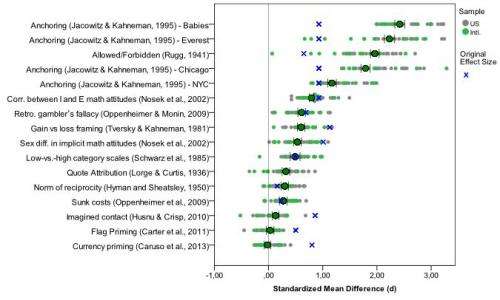November 28, 2013 report
Psychologists collaborate to reproduce experimental results

(Medical Xpress)—Psychological studies have a bad reputation for delivering results that researchers never reproduce. Repeatedly, psychologists have been unable to replicate the effects of classic studies. To test the reproducibility of psychological experiments, researchers from around the world worked together to repeat 13 studies, using thousands of subjects in different locations. Their collaborative work, the Many Labs Replication Project, reproduced the effects of 10 of these 13 studies. The research can be found online and will appear in a special issue of Social Psychology in Spring 2014.
In scientific research, reproducibility is essential. An irreproducible experiment might have a design flaw, or its results might be applicable only to a small population or within a particular setting. While direct replications of experiments are standard in other scientific disciplines, they are uncommon in psychology. The failure of psychologists to reproduce the results of classic studies and the recent discovery of instances of fraud have tarnished psychology's reputation as a legitimate science.
To see just how reliable psychological studies are, a team of more than 150 researchers in 36 laboratories, 25 in the United States and 11 in other countries, repeated 13 classic and contemporary psychological studies, combined into one interactive experiment, on 6,344 different subjects. Some of the subjects completed the studies in the lab, while others completed them remotely over the Internet. Such a large collaborative project, covering a diverse group of subjects in a wide range of settings, is unusual in psychology, where a small group of psychologists in one lab will often be the only people conducting an experiment.
The scientists were able to reproduce the results of 10 of the 13 studies. In five of these, including a classic study on anchoring by Nobel laureate Daniel Kahneman, the statistical effect was stronger than in the original experiment. The anchoring study showed that the first piece of information you receive about a topic biases your future decisions.
They could not replicate the effects of two recent studies on social priming. Originally, one of these showed that exposing Americans to an American flag makes them more likely to express conservative opinions. The other showed that exposing people to money makes them more likely to endorse their country's current social system.
There was only weak support for the 13th study, which showed that imagining someone from another ethnic group makes you less likely to be prejudiced toward members of the group.
The nationality of the participants, and whether they completed the study online or in the lab, had no effect on the results. This means that reproducibility depended more on the perceived effect itself than on the setting or subject sample.
More information: openscienceframework.org/project/WX7Ck/
© 2013 Medical Xpress
















